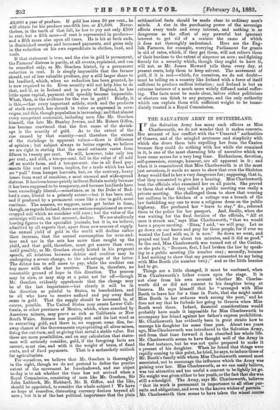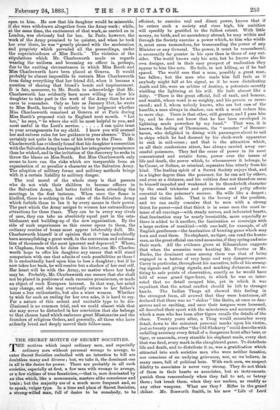THE SALVATION ARMY IN SWITZERLAND.
TF the Salvation Army has many such officers as Miss Charlesworth, we do not wonder that it makes converts. Her account of her conflict with the " Unsaved " authorities
of Geneva, and of the mingled acuteness and simplicity with which she drove them into expelling her from the Canton because they could do nothing with her while she remained in it, is one of the most charming bits of narrative which we have come across for a very long time. Enthusiasm, devotion, self-possession, courage, humour, are all apparent in it ; and when it is remembered that Miss Charlesworth is at the most just seventeen, it needs no more to show that even the Skeleton Army would find in her a very dangerous foe ; supposing, that is, that they consented to give her a hearing. Miss Charlesworth beat the officials who examined her on all points. She proved to them that what they called a public meeting was really a private meeting. She challenged them to show that wearing her uniform in the kitchen of a cottage was a breach of the law forbidding any one to wear a religious dress on the public highway. She produced her " leave to stay," &c., referred them to the police for her passport. And, finally, when she was waiting for the final decision of the officials, "All at once it struck me," says Miss Charlesworth, " that we would have a prayer meeting. Zitza,' I said, we will pray. Let us go down on our knees and pray for these people, for if ever we wanted the Lord with us, it is now.' So down we went, and prayed out loud for about ten minutes, and it did ns good." In the end, Miss Charlesworth was turned out of the Canton, as she puts it, Because, first, I had broken the law by speak- ing in a public meeting (lie number one) ; secondly, because I had nothing to show that my parents consented to my being with Miss Booth (lie number two) ;" and so the little heroine had to go.
Things are a little changed, it must be confessed, when M.ss Charlesworth's father comes upon the stage. It is not clear from his own account whether Mr. Charles- worth did or did not consent to his daughter being at Geneva. He says himself that he " arranged with Miss Booth to leave her for a time in Paris, that she might assist Miss Booth in her arduous work among the poor," and he does not say that he forbade her going to Geneva when Miss Booth went there. Indeed, financial considerations would probably have made it impossible for Miss Charlesworth to accompany her friend against her father's express prohibition. Mr. Charlesworth has evidently been in great straits how to manage his daughter for some time past. About two years ago, Miss Charlesworth was introduced to the Salvation Army, and from that time forward it has absorbed her whole life. Mr. Charlesworth seems to have thought well of the Army in the first instance, but he was not quite prepared to make it a present of his daughter. When he found that things were rapidly coming to this point, he tried, he says, to induce those of Mr. Booth's family with whom Miss Charlesworth seemed most associated, not to encourage the influence which the Army was gaining over her. Miss Charlesworth, as we can easily believe, was too attractive and too useful a convert to be lightly let go. No weight was given either to her youth, or the fact that she was still a schoolgirl. The Army, says Mr. Charlesworth, believes " that its work is paramount in importance to all other pur- suits and obligations, and even to the known wishes of parents." Mr. Charlesworth then seems to have taken the wisest course
open to him. He saw that his daughter would be miserable, if she were withdrawn altogether from the Army work ; while, at the same time, the excitement of that work, as carried on in London, was obviously bad for her. In Paris, however, the work of the Army promised to be quieter, and when he took her over there, he was "greatly pleased with the moderation and propriety which pervaded all the proceedings, under the superintendence of Miss Booth." The violation of the stipulations which Mr. Charlesworth made as regards wearing the uniform and becoming an officer is, perhaps, due to the exciting circumstances in which Miss Booth and Miss Charlesworth have been placed at Geneva. It would probably be almost impossible to restrain Miss Charlesworth from doing everything that her friend did, when it became a question of sharing that friend's bonds and imprisonment. It is fair, moreover, to Mr. Booth to acknowledge that Mr. Charlesworth has evidently been more willing to allow his daughter to take part in the work of the Army than he now cares to remember. Only so late as January 31st, he wrote to Miss Booth, leaving it entirely to her judgment whether Miss Charlesworth remained at Geneva or at Paris during Miss Booth's proposed visit to England next month. " Let her," he says, " be where she will be most helpful to you, and
most useful in the Lord's service I can quite trust to your arrangements for my child. I know you will counsel her and enforee rules for her guidance in your absence." This is certainly not quite in the tone of his letter to the Times. Mr. Charlesworth has evidently found that his daughter's connection with the Salvation Army has brought her into greater prominence than he wished, and in the irritation of the discovery he seeks to throw the blame on Miss Booth. But Miss Charlesworth only seems to have run the risks which are inseparable from an organisation of so peculiar a character as the Salvation Army. The adoption of military forms and military methods brings with it a certain liability to military danger.
The real moral of the whole story is that parents who do not wish• their children to become officers in the Salvation Army, had better forbid them attending the meetings in the first instance. When once the flame is kindled, there is nothing in the rules of the Salvation Army which forbids them to fan it by every means in their power. The part which the Army assigns to women has extraordinary attractions for these times. They can be in every way rivals of men, they can take an absolutely equal part in the esta- blishment and building-up of the new organisation. By the side of such experiences as this career opens to them, the ordinary routine of home must appear intolerably dull. Mr. Charlesworth himself is of opinion that it " has undoubtedly been accomplishing a great work, in the conversion and reforma- tion of thousands of the most ignorant and depraved." Where, in Clapham, from which he dates his letter, can Mr. Charles- worth hope to offer his daughter any career that will stand comparison with one that admits of such possibilities as these I It is undoubtedly hard upon him to lose a daughter ; but if he now takes her back, he will receive but a shadow of her real self. Her heart will be with the Army, no matter where her body may be. Probably, Mr. Charlesworth can ensure that she shall not be placed in positions of such excessive prominence, or made an object of such European interest. In that way, her mind may change, and she may eventually return to her father's house a less enthusiastic, but also a wiser woman. Whether to wish for such an ending for her own sake, it is hard to say. For a nature of this ardent and excitable type to be dis- illusioned is no common trial, and we could almost wish that she may never be disturbed in her conviction that she belongs to that chosen band which embraces great Missionaries and the founders of religious Orders, and generally, all those who have ardently loved and deeply moved their fellow-men.



































 Previous page
Previous page